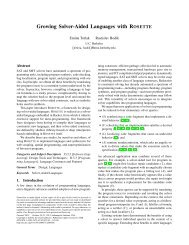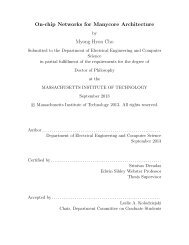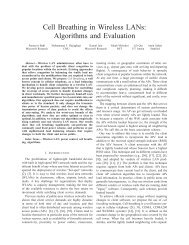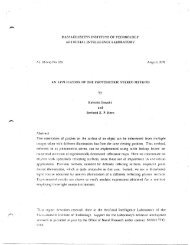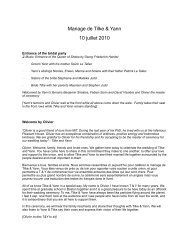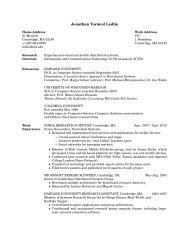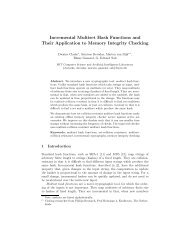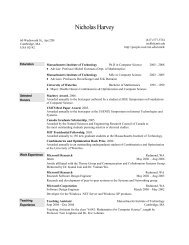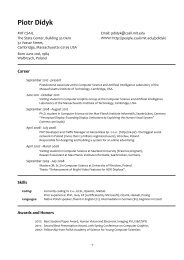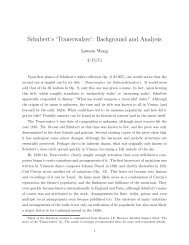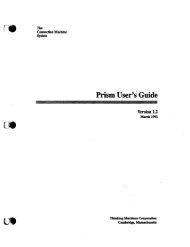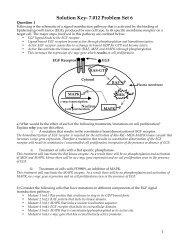glyphosate: destructor of human health and biodiversity - People
glyphosate: destructor of human health and biodiversity - People
glyphosate: destructor of human health and biodiversity - People
You also want an ePaper? Increase the reach of your titles
YUMPU automatically turns print PDFs into web optimized ePapers that Google loves.
Acute kidney injury (AKI) (See Graph 7 for US increases since 1990)<br />
A new guideline report issued on Wednesday (28/08/2013) from the National Institute for<br />
Health <strong>and</strong> Care Excellence (Nice) says AKI (a sudden loss <strong>of</strong> kidney function) costs the<br />
NHS between £434m <strong>and</strong> £620m a year – more than it spends on breast, lung <strong>and</strong> skin cancer<br />
combined 97 . Between 262,000 <strong>and</strong> 1 million people admitted to hospital as an emergency in a<br />
year will have AKI, <strong>of</strong> which just under a quarter will die. Dr Mark Thomas, chair <strong>of</strong> the new<br />
guideline development group <strong>and</strong> nephrologist at the Heart <strong>of</strong> Engl<strong>and</strong> NHS Foundation<br />
Trust, said: "AKI has been something <strong>of</strong> a Cinderella condition in the past both within<br />
<strong>health</strong>care <strong>and</strong> in the public perception, yet it kills more people than any <strong>of</strong> the common<br />
cancers.” He said AKI "is clearly one <strong>of</strong> the major patient safety issues for the NHS. It affects<br />
the vulnerable <strong>and</strong> leads to thous<strong>and</strong>s <strong>of</strong> unnecessary deaths because <strong>of</strong> failings in care."<br />
Pr<strong>of</strong>essor Donal O'Donoghue, the government's national clinical director for kidney care<br />
from 2007 to earlier this year, has said 32 people die needlessly every day from AKI. He said<br />
AKI represented a "<strong>human</strong> tragedy".<br />
EFSA’s new assessment <strong>of</strong> GM crops 98<br />
The European Food Safety Authority (EFSA) has finally issued new guidelines for two-year<br />
whole food feeding studies to assess the risk <strong>of</strong> long-term toxicity <strong>and</strong> carcinogenicity from<br />
GM foods.<br />
Non-Hodgkin’s Lymphoma & Hairy Cell Leukemia<br />
Two Swedish studies suggested that herbicides, particularly <strong>glyphosate</strong>, were associated with<br />
the above conditions.<br />
Lennart Hardell, Mikael Eriksson, Marie Nordstrom: Exposure to pesticides as risk factor for<br />
non-Hodgkin's lymphoma <strong>and</strong> hairy cell leukemia: pooled analysis <strong>of</strong> two Swedish casecontrol<br />
studies. Leuk Lymphoma. 2002 May; 43(5):1043-9 99<br />
Increased risk for non-Hodgkin's lymphoma (NHL) following exposure to certain pesticides<br />
has previously been reported. Among herbicides, significant associations were found for<br />
<strong>glyphosate</strong> (OR 3.04, CI 95% 1.08-8.52) <strong>and</strong> 4-chloro-2-methyl phenoxyacetic acid (MCPA)<br />
(OR 2.62, CI 95% 1.40-4.88). For several categories <strong>of</strong> pesticides the highest risk was found<br />
for exposure during the latest decades before diagnosis<br />
Eriksson M, Hardell L, Carlberg M, Akerman M. Pesticide exposure as risk factor for non-<br />
Hodgkin lymphoma including histopathological subgroup analysis 100 . Int J.Cancer. 2008,<br />
123:1657-1663. In this category the dominating agent was <strong>glyphosate</strong>, which was reported by<br />
29 cases <strong>and</strong> 18 controls, which produced OR (Odds Ratio) 2.02 (95% CI 1.10–3.71)<br />
Glyphosate induces <strong>human</strong> breast cancer cells growth via estrogen receptors<br />
Thongprakaisang S, Thiantanawat A, Rangkadilok N, Suriyo T, Satayavivad J. Glyphosate<br />
induces <strong>human</strong> breast cancer cells growth via estrogen receptors. Food Chem Toxicol. 2013,<br />
59C: 129-136. doi: 10.1016/j.fct.2013.05.057 101<br />
The study found that breast cancer cell proliferation is accelerated by <strong>glyphosate</strong> in extremely<br />
low concentrations. “The present study used pure <strong>glyphosate</strong> substance at log intervals from<br />
97 .http://www.theguardian.com/society/2013/aug/28/kidney-care-lives-nice<br />
98 http://www.efsa.europa.eu/en/efsajournal/pub/3347.htm<br />
99 http://www.ncbi.nlm.nih.gov/pubmed/12148884<br />
100 http://onlinelibrary.wiley.com/doi/10.1002/ijc.23589/full<br />
101 http://www.ncbi.nlm.nih.gov/pubmed/23756170<br />
31



